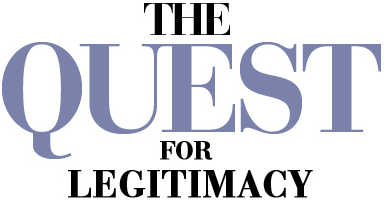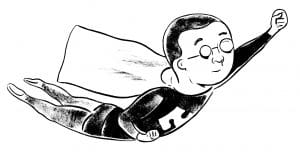

Our growing fascination with the Land of Giants* (see footnote) has sparked intense conversations. Whether attending an event at a family business cent.er or randomly sitting next to a rising-gen family member on a plane, talking about the Giants, arouses an immediate response, complete with family business stories. Those who are natives understand the land without any further explanation. They have grown up in the shadow of their parents and grandparents, whose accomplishments loom large. Power and infallibility are reflected in the stories passed between generations. The Giants, appear larger than life. The bar for success is set high for those raised in the Land of Giants. Descendants of Giants, depending on their emotional[ connection and perceptions reach, ignore, or push away the bar. They know the bar exists.
Those who have overheard a conversation with the expression, the Land of Giants, will wonder whether this refers to a game, app, movie, or book. It is an image of power, immediately conjuring up images of eluding or destroying the giants.. Many know the Giants in their own community and call name them.

SIDEBAR

This week’s contributor, Jamie Weiner will ibe presenting on a related topic at the 2018 FFl Global Conference where participants will actively explore “rites of passage” stimulated by the voices of rising generation family members.
Consultants working with family business are engaged by the “giants” or their agents. Succession, wealth distribution, or preservation discussions spontaneously lead back to concerns about the clients’ children, the Next Gen. Often the framework for these discussions is: ”Are they prepared?” or “What will be the impact of wealth on their ambition?”
What is it like to be a Rockefeller?
Over a year ago, I. had dinner with Adam Rockefeller Groswald, David Rockefeller’s grandson, and Justin Rockefeller, Nelson Rockefeller’s grandson. The conversation offered a glimpse into their world. The impact of the family’s tradition of philanthropy, their history of developing governance, family meetings, and preparing future generations was the highlight of our conversation. In conversation, Adam and Justin, touched on their personal journeys to establish their own identities, while growing up in the Land of Giants.
The book “Being a Rockefeller, Becoming Myself” by Eileen Rockefeller, Adam’s mother, peeled back the “veil of one of America’s most private families:· In the book, Eileen notes that others might believe that she “won the Lottery at birth,” but she describes her childhood as lonely and challenging. Before she could establish herself and find her own success, she embarked on a personal journey. Her accomplishments made her a Giant, in her own right. Knowing her own childhood experience, she and her husband consciously created experiences to bring their family together to build relationships.
What does it feel like to be a Rabbi’s kid?
Recently while participatingi in a meeting with the “rising generation” of prominent families I was drawn back to my own Life. My grandparents on both sides were first-generation business owners and wealth holders in Europe. My father had been ordained as a rabbi in Breslau, and he and my mother journeyed through what was then called Palestine, by boat through India to the United Stat:es in the late 1930’s. By the time I was born there was no business or wealth to pass down.
Fast forward to the time of my Bar Mitzvah – my father was now a welt-known rabbi in Skokie, Illinois. In my world, he was a Giant. His office was located behind the Ark and the Eternal Light. The Torah, scrolls, the Jewish sacred text, lived within the Ark. Part of my father’.s ritual was to enter the sanctuary from behind the Ark. At one family service, when my father appeared, a young voice asked, “Is that God?” I thought, “No, that is my father:· Growing up, I believed my experience was unique to “clergy kids.” However, the experience of being raised in the Land of Giants cuts across a wide spectrum of families, levels of wealth, and cultures. How much is enough? What is too much? Can you hear the voice of the Giants? As consultants, we are easily drawn into this discussion.

Voices of the Rising Generation
Living in the shadow of elders who pursued their dreams is the struggle for rising generations. Jay Hugihes, Jr. and his colleagues, in The Voice of the Rising Generation, articulate the challenge of losing one’s voice behind the mountain of a parent’s successes, and possibly not realizing one’s own dreams. This is a consequential loss. For many of the rising generation, there is a journey they need to take to develop their own identity outside the shadow.
In one of my consulting experiences, I encountered a set of siblings that surprised their parents when they shared that they could not picture being able to create a place in the community Like their parents had, while running a business and finding time for family. Having worked with a number of rising gen family members who stumble along the way, ending up in drug or psychological[ treatment, it is dear that the road has its bumps.
Creating rites of passage in a global world
Rites of passage offer a conscious and a ceremonial approach for dealing with the angst of rising generation family members who have difficulty finding their place within multigenerational families.
The family and its members each benefit from the creation of a rite of passage. In a world with global reach and connections, the family that adapts and evolves has a legacy that lasts multiple generations. The challenge is creating one that aligns with the family’s unique culture.
Consultants often work in partnership with a family to assist in the creation of a rite of passage. The pre-step is convincing the Giant to support the rite of passage. First, the Giant begins by defining his or her own path toward becoming an elder with meaningful responsibility: Next, the elder assures the rising gen family members that by going through the process their voices will be heard and respected.

Tradiitionally passage to adulthood was a series of steps legitimized by the community. Most cultures require self-awareness as part of a transition. A definitive action is important. Joanne Stem, PhD of Family Wealth Preservation Consulting and I outlined three stages that are required for creating a successful rite of passage. They are:
Stage 1: Separation – The rising generation has to step out of the shadow. This begins by acknowledging the legends. of the Giants.
Stage 2: Transition – The requirement to become self-aware enables rising generations to gmw and define themselves, outside of the shadow.
Stage 3: Reintegration – For the rising generations, by aligning their values to their action, they reconnect with the family as an adult.
The Rising Cen as an asset
Rising generation family members encouraged to innovate naturally take the kind of risks that are associated with “rite of passage” rituals. The unique flexibility of privately held enterprises opens the way for them be the incubator for the dreams of the rising gen. (McKenzie & Company, 2016-KFine tuning family business for a new era Bjornberg., Karina Dias, & Etstrod)
Challenges to current hierarchical thinking begin by viewing the rising gen as an asset. A global generation with its own dreams, opens new horizons. To effectively pass the baton, rites of passage are essential to create.
“land of Giants was an American television show that ran on ABC from September 1968-March 1970. It tells the story of the crew and passengers of a transport ship that is dragged through a space warp to a mysterious planet where everything is twelve times larger than on Earth, whose inhabitants the Earthlings nickname “the Giants.”

© 2018 The Family Firm Institute

